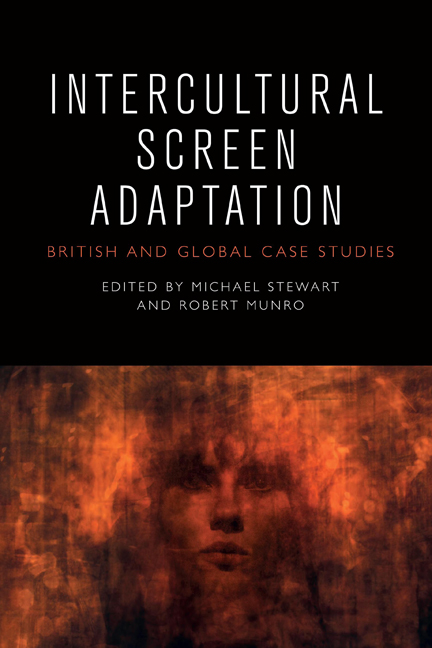Book contents
- Frontmatter
- Contents
- List of Illustrations
- Acknowledgements
- List of Contributors
- Introduction
- PART I NOSTALGIA, HERITAGE AND THE TOURIST GAZE
- 1 Adapting Pagnol and Provence
- 2 ‘A Tourist in Your Own Youth’: Spatialised Nostalgia in T2: Trainspotting
- 3 ‘200 Miles Outside London’: The Tourist Gaze of Far from the Madding Crowd
- PART II RADICAL CONTINGENCIES: NEGLECTED FIGURES AND TEXTS
- 4 Reframing Performance: The British New Wave on Stage and Screen
- 5 Why We Do Not Adapt Jean Rhys
- PART III RE-ENVISIONING THE NATIONAL IMAGINARY
- 6 ‘To see oursels as ithers see us’: Textual, Individual and National Other-selves in Under the Skin
- 7 Back to the Future: Recalcitrance and Fidelity in Julieta
- PART IV THE LOCAL, THE GLOBAL AND THE COSMOPOLITAN
- 8 El Patrón Del Mal: A National Adaptation and Narcos Precedent
- 9 Constructing Nationhood in a Transnational Context: BBC’s 2016 War and Peace
- 10 The Beautiful Lie: Radical Recalibration and Nationhood
- PART V REMAKING, TRANSLATING: DIALOGUES ACROSS BORDERS
- 11 In Another Time and Place: Translating Gothic Romance in The Handmaiden
- 12 Chains of Adaptation: From D’entre les morts to Vertigo, La Jetée and Twelve Monkeys
- 13 A ‘Double Take’ on the Nation(al) in the Dutch-Flemish Monolingual Film Remake
- Index
9 - Constructing Nationhood in a Transnational Context: BBC’s 2016 War and Peace
Published online by Cambridge University Press: 22 September 2020
- Frontmatter
- Contents
- List of Illustrations
- Acknowledgements
- List of Contributors
- Introduction
- PART I NOSTALGIA, HERITAGE AND THE TOURIST GAZE
- 1 Adapting Pagnol and Provence
- 2 ‘A Tourist in Your Own Youth’: Spatialised Nostalgia in T2: Trainspotting
- 3 ‘200 Miles Outside London’: The Tourist Gaze of Far from the Madding Crowd
- PART II RADICAL CONTINGENCIES: NEGLECTED FIGURES AND TEXTS
- 4 Reframing Performance: The British New Wave on Stage and Screen
- 5 Why We Do Not Adapt Jean Rhys
- PART III RE-ENVISIONING THE NATIONAL IMAGINARY
- 6 ‘To see oursels as ithers see us’: Textual, Individual and National Other-selves in Under the Skin
- 7 Back to the Future: Recalcitrance and Fidelity in Julieta
- PART IV THE LOCAL, THE GLOBAL AND THE COSMOPOLITAN
- 8 El Patrón Del Mal: A National Adaptation and Narcos Precedent
- 9 Constructing Nationhood in a Transnational Context: BBC’s 2016 War and Peace
- 10 The Beautiful Lie: Radical Recalibration and Nationhood
- PART V REMAKING, TRANSLATING: DIALOGUES ACROSS BORDERS
- 11 In Another Time and Place: Translating Gothic Romance in The Handmaiden
- 12 Chains of Adaptation: From D’entre les morts to Vertigo, La Jetée and Twelve Monkeys
- 13 A ‘Double Take’ on the Nation(al) in the Dutch-Flemish Monolingual Film Remake
- Index
Summary
War and Peace is a BBC [British Broadcasting Corporation] Cymru Wales drama production, in partnership with the Weinstein Company and BBC Worldwide/Lookout Point. It was first broadcast on BBC One in January 2016, attracting six million viewers per episode. Although the BBC may be famous for its costume drama adaptations, which have become an intrinsic part of its brand appeal, adapting a giant of Russian and world literature would have been a challenging task. The 2016 adaptation had a lot to prove, after the BBC's previous 1972–3 adaptation of War and Peace, starring Anthony Hopkins, which numbered seventeen episodes. On the big screen, King Vidor's 1956 celebritystudded Hollywood extravaganza and Bondarchuk's 1965–7 Oscar-winning definitive Russian take on War and Peace left emblematic imprints. Producer Julia Stannard and writer Andrew Davies thus had the challenge of entering a busy space of ‘dialogic intertextuality’ (Stam in Burry 2016: 6) and an ongoing symbolic dialogue between various high-profile intertexts.
The chapter uses a limited comparative approach. Bondarchuk's four feature films made in the 1960s have become a key reference point for any Tolstoy adaptation, since they were adapted from inside Russian culture. The BBC‘s 2016 adaptation, on the other hand, takes the viewpoint of an outsider looking into the specificities of Russian culture at a sensitive time in European politics. Bondarchuk's adaptation of War and Peace can thus illuminate and aid the analysis of Davies's adaptation, although the focus must remain on the 2016 television text. Comparisons between adaptations produced for cinema andtelevision respectively, are not new, as Sarah Cardwell attests (2005). She analysed the challenges Davies faced in 2002 when he adapted Doctor Zhivago for the BBC, in the shadow of David Lean's big feature film from 1965. Cardwell expertly moved the analysis between the two adaptations, showing how Davies shifts emphasis in his more modern take for the small screen and makes references to Lean's film and other adaptation sources (Cardwell 2005: 173). ‘I would argue for intertextual criticism as a viable alternative to fidelity criticism’, Cardwell proclaimed (2005: 173), and we have heeded that call.
- Type
- Chapter
- Information
- Intercultural Screen AdaptationBritish and Global Case Studies, pp. 155 - 171Publisher: Edinburgh University PressPrint publication year: 2020



